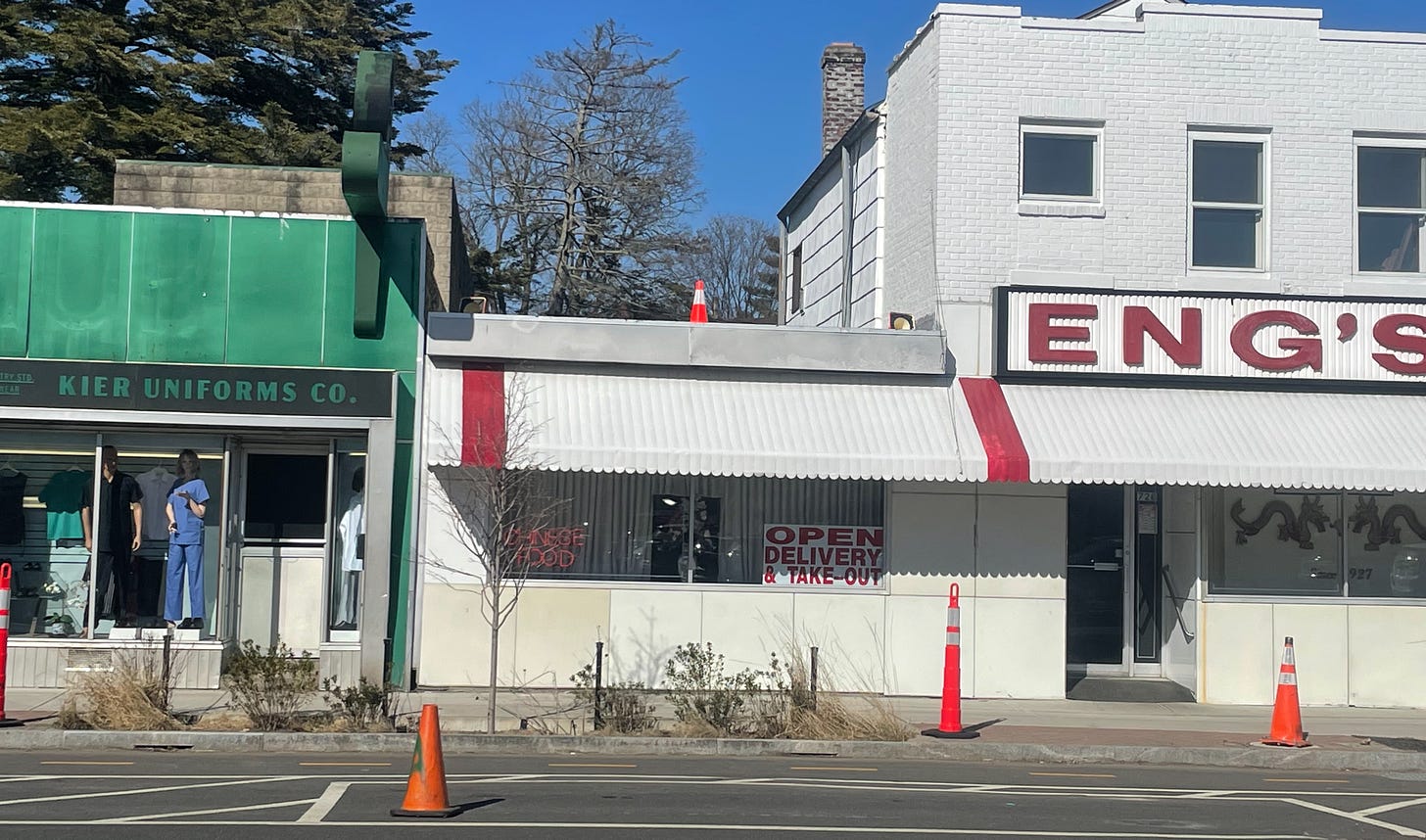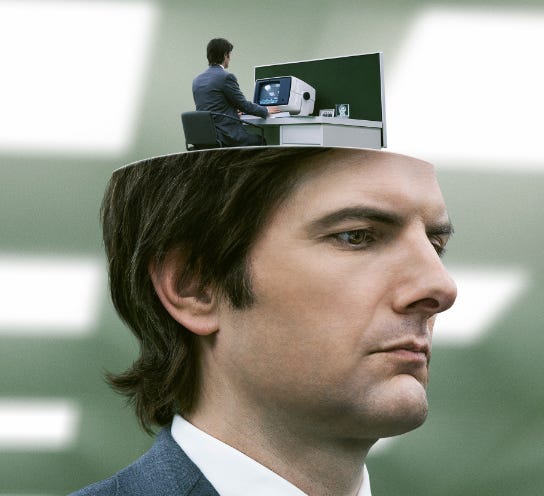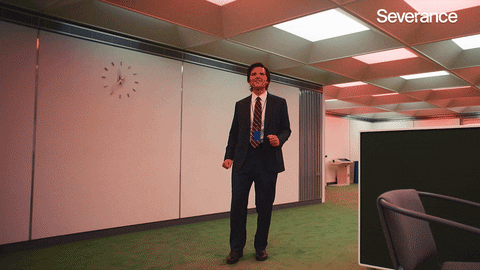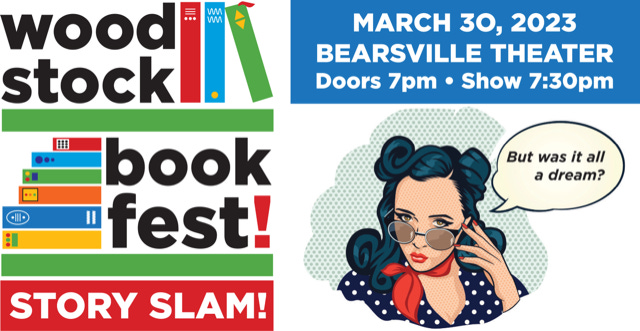Sever Me
On the difficulty of achieving work/life balance, especially when your work involves writing about your life and helping others do the same.
Today Apple TV’s Severance—one of my favorite shows—is shooting pretty much around the corner from my house in Kingston, NY. My husband Brian is working from home because the production has taken over the parking lot of his office building, located across the street from what appear to be sets: Eng’s Chinese restaurant and a former video store that has been repurposed as “Kier Uniforms Co.”
The other day I walked by and didn’t notice the sign, and thought, “Oh, wow, a new store.” (The hype about Kingston has brought lots of commercial real estate speculation, which ironically has led to many empty storefronts. I’m happy to see any new businesses come in.) Then Brian pointed out the sign and its reference to Kier Eagan, founder of Lumen, the company that “severs” its employees’ brains to create a clear distinction between their professional and personal lives. Now this is on repeat in my head:
Severance is a dark comedy that extrapolates the concept of work-life balance to an absurdist, dystopian degree. Brian and I loved it so much that he’s watched Season 1 four times, and I’ve watched it three. (I was out of town the week he watched it the fourth time.)
I think it resonated so strongly, for me at least, because my work and my life are inextricably linked. “Ethnography of the self” (and helping others achieve the same) is not a job one can easily cast aside at 5pm, especially when events that occur after the factory whistle blows constitute much of your subject matter.
I’m least able to cast thoughts of work aside at 4am, when insomnia strikes and I find myself reviewing every one of my life choices, both personal and professional. I’ve been doing a lot better, depression wise (acupuncture FTW), but in the blackness of the night, when I’m staring at the ceiling and debating whether to get up and take a melatonin or indica gummy, my emotional floor drops out and my mood plummets, and I wonder if at least a small part of that is occupational hazard.
When I witness Adam Scott’s character, Mark S., struggling with grief and deep depression in his “outie” life as a recent widower, then being chipper and agreeable in his waking hours at Lumen, I understand the appeal of having a very separate “innie” life by day, with a version of me that goes somewhere else to be productive in some way for eight hours, free of all my “outie’s” emotional baggage. How liberating it might be to escape myself for a third of each day.
But in my work as an essayist and memoirist—and an editor and teacher who works with other essayists and memoirists—the emotional baggage is the topic at hand, mine and everyone else’s. There’s no escaping it. This isn’t inherently bad. I chose this career and life because it is precisely emotional baggage and the human interactions that cause it that fascinate me above all else. I’m lucky to be able to earn a living at this.
But this work also takes a psychic toll, especially now that diminishing returns in publishing and media mean that, increasingly, I have to take on more of it in order to survive. I spent last weekend doing tax prep, and it forced me to take in just how many writers’ essays I’ve edited (and paid for) for
and in the past year, how many students I taught and provided with constructive feedback at Baypath, Wilkes, Catapult, and Kingston Writers’ Studio. Not to mention submissions I’ve read and responded to, and publicists I've corresponded with regarding authors' book excerpts they've wanted me to publish. It's a lot. And it's hard to imagine a time when I'll get to do less of it, leaving time to work on my own essays, my next memoir, the novel I started in 2016, and other creative projects I'm eager to start.When I witness Adam Scott’s character, Mark S., struggling with grief and deep depression in his “outie” life as a(n alleged) widower, then being chipper and agreeable in his waking hours at Lumen, I understand the appeal of having a very separate “innie” life by day, with a version of me that goes somewhere else to be productive in some way for eight hours, free of all my “outie’s” emotional baggage.
I do love my work, but I wish I didn’t need to take on so much. And as I mentioned in an essay for Catapult last year (RIP Catapult!), and an excerpt of my book published on Gloria, I wish I knew when I was starting out that I could have any other kind of day job and still be a writer—granted on the side, nights, weekends, vacations. I derive a little bit of peace imagining an alternate universe version of myself as, like, an MRI tech, in scrubs and Danskos. That’s not to say that I believe being an MRI tech is easy. But it’s entirely separate from my creative ambitions, and maybe I’m wrong, but it also seems like the kind of job whose concerns you can leave at the office at the end of the day.
At 57 it’s probably too late for me to take that kind of career turn. And who knows, maybe there’s some way that in the future, I can strike a better balance with the work I’m doing. Hope springs eternal.
Now, if you’ll excuse me, I’m going to go casually stroll by Engs and “Kier Uniforms Co.” and see if they can use any extras on set.
In other news…
The Woodstock Bookfest is back, March 30th to April 2nd in Woodstock, NY! If you attend, don’t miss the personal essay panel on April 1st, at 3:30pm, featuring Alexander Chee, Gary Shteyngart, and Carolita Johnson, moderated by me. Also, I’ll be one of three judges at the Bookfest’s story slam on Thursday, March 30th. Don’t miss it!







You’d be an excellent candidate for a Guggenheim; I know it often takes many tries but you merit that support. Just a thought. <3
FWIW, I had a similar fantasy about healthcare work as a way to “leave it at 5 pm” and went through the schooling to become a registered dental hygienist.
Turned out I was good at it, serious about doing it well, cared about helping patients, and... could not leave it at 5pm. I was exhausted and emotionally consumed at the end of the day. I saw glaring holes in what we told patients, and in the research. I wanted to address those problems, but didn’t have energy for that. Plus, I resented having no energy to work on my art (or the necessary mental incubation time--which I’ve come to recognize as indispensable.)
Now I’m 5 years into my own passion-for-pay career. I still have zero work/life separation. (Especially at 4am.) I don’t make much money. There’s lots of admin and bs that isn’t me-doing-the-thing-I-love, but it’s all in service of one big picture.
I’m glad to have the perspective that there really is no easier way. There’s no “out.” At least psychologically. (Financially, there are demonstrably more lucrative options than following your passion lol.)
Maybe you’d be a great MRI tech who could write at night! Some people can do it. But I think they’re the exception.
As someone who tried it, maybe my experience can save you the trouble?